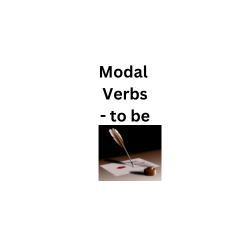Modal Verbs: to be

Modal Verbs: to be
To be can be used as a modal verb in certain situations, although it is not as common as other modal verbs like can, must, or should.
When to be is used as a modal verb, it is usually followed by an infinitive without to, and is used to express a sense of obligation or necessity.
Usage of to be for
(expressing obligation)
We are to meet at the station at 3 PM.
(expressing necessity)
He is to finish his project by Friday
(expressing expectation)
The president is to make an announcement later today.
In these examples, to be is used as a modal verb to express an obligation, necessity, or expectation.
Note that to be is conjugated to match the subject of the sentence, and is followed by an infinitive without to.
To be and modal verbs: going to or will
To be can also be used in combination with other modal verbs like going to or will to express future plans or intentions, as in:
We are going to be traveling to Europe next month.
She will be arriving at the airport at 5 PM.
In these examples, to be is used to indicate future plans, and is combined with other modal verbs to form a future tense construction.
Click here Modal Verbs: to be
Click here Auxiliary Verbs: to have
Click here Auxiliary Verbs
Click here Auxiliary and Modal verbs